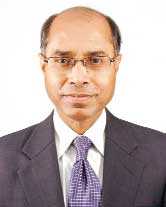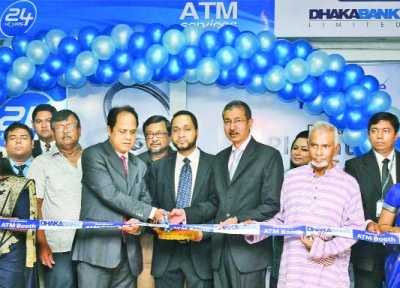Banking
IBBL workshop for IT officials held in city
 Prof Abu Nasser Muhammad Abduz Zaher, Chairman of IBBL, presides over a training course at Mohammad Younus Auditorium in Dhaka Sunday.
Prof Abu Nasser Muhammad Abduz Zaher, Chairman of IBBL, presides over a training course at Mohammad Younus Auditorium in Dhaka Sunday.
Islami Bank Bangladesh Limited (IBBL) organised a five-day training course for its IT officials at Mohammad Younus Auditorium in Dhaka Sunday.
Prof Abu Nasser Muhammad Abduz Zaher, Chairman of the Bank, presided over the training course as the chief guest, said a press release.
Mohammad Abdul Mannan, Managing Director, Engineer Eskander Ali Khan, Chairman of Executive Committee and Engineer Muhamamd Dawood Khan, sponsor and former director of the Bank spoke as special guests.
Md Nurul Islam, Eng Mohammad Abul Bashar, Syed Abdullah Mohammad Saleh, Deputy Managing Directors and Abu Taher Mohammad Saleh, Executive Vice President and Director General of Islami Bank Training and Research Academy (IBTRA) attended the programme.
Abdus Sadeque Bhuiyan, Executive Vice President and Head of Human Resources Division also spoke.
News: The Daily Sun/Bangladesh/15th-Oct-12
Gofran made AMD of Southeast Bank
 Mohammed Gofran was promoted to Additional Managing Director (AMD) of Southeast Bank Limited.
Mohammed Gofran was promoted to Additional Managing Director (AMD) of Southeast Bank Limited.
Prior to his new assignment, he was Deputy Managing Director of the bank, said a press release.
He joined Southeast Bank as Executive Vice President in 2003 and subsequently promoted to Senior Executive Vice President and Deputy Managing Director in 2006 and 2010.
He started his banking career as a probationary officer at Pubali Bank Limited in 1977.
During his 35 years banking career, he worked at Pubali Bank, National Bank, EXIM Bank and Jamuna Bank and visited many places including Japan, Thailand, India and USA to attend seminars and workshops.
News: The Daily Sun/Bangladesh/15th-Oct-12
Dhaka Bank opens booths in Dhaka, Sirajgonj
 Niaz Habib, Additional Managing Director of Dhaka Bank, inaugurates an ATM booth in Dhaka recently.
Niaz Habib, Additional Managing Director of Dhaka Bank, inaugurates an ATM booth in Dhaka recently.
Dhaka Bank Limited recently opened ATM booths at Rajuk Trade Center at Uttara and Shimnato Square at Dhanmondi in Dhaka and at Belkuchi in Sirajgonj.
Niaz Habib, Additional Managing Director of Dhaka Bank, formally inaugurated the Dhaka booths, said a press release.
News: The Daily Sun/Bangladesh/15th-Oct-12
IMF meeting heralds shift away from austerity
The curtains came down Sunday on IMF and World Bank meetings that were dominated by a gathering row over whether austerity or growth should come centre stage as the world economy seeks a reboot.
The International Monetary Fund -- criticised in the past for its strict prescription of the bitter medicine of deficit cuts -- used the week to articulate a moderated position emphasising growth.
That brought its Managing Director Christine Lagarde into conflict with champions of austerity, in the person of German Finance Minister Wolfgang Schaeuble, who insisted there was "no alternative" to budget-slashing.
The dispute was the centrepiece of events in Tokyo, as they jockeyed over how strict to be on countries with runaway deficits.
Lagarde caused a stir on Thursday when she said she was happy for Greece -- bleeding from the spending cuts demanded by international creditors -- to have two more years to meet its deficit-reduction targets.
The following day, Schaeuble said there was "no alternative" to slashing bloated national balance sheets, demands to which Athens and other troubled eurozone capitals have agreed in exchange for multi-billion euro bailouts.
On Saturday both insisted they were on the same page.
"We are in complete agreement with the IMF, and especially with Ms. Lagarde, that in a mid-term view the reduction of too-high debt levels is completely unavoidable," Schaeuble told reporters.
As they sought to paper over the cracks, Lagarde told a separate news conference that talk of a split was over-done.
"In reality, what has been presented as disagreement is more about perception than reality," she said.
"We all recognise that credible, medium-term fiscal adjustments are necessary in all advanced economies... (but it must) be calibrated on a country-by-country basis... it cannot be one-size-fits-all."
Calls for moderation in the pace of fiscal tightening have grown over recent months, with sometimes-violent street protests in debt-laden European countries as joblessness grows and social welfare programmes are trimmed.
There are also escalating fears that cuts are a drag on the global economy.
News: The Daily Star/Bangladesh/15th-Oct-12
Govt yet to decide on absolute authority for BB
 AMA Muhith
AMA Muhith
The government is still undecided over the key donor condition of giving more authority to the central bank over the state-run banks, despite not having much time in hand.
The parliament must pass the Banking Companies Act as well as the VAT Act within the next month for the country to be able to get the second instalment of $1 billion from the International Monetary Fund (IMF).
"Still, there is no consensus over the reforms in the Banking Companies Act," said Finance Minister AMA Muhith.
Providing full control to the Bangladesh Bank over the state-run commercial banks remains a sticking issue of the Banking Companies Act.
"We have informed the IMF about our position and they have informed us of their decision. They want to see the language of the law [before it is passed]. I told them that would be possible,” Muhith told The Daily Star in Tokyo on Saturday.
The IMF wants the government to cut the authority of the Banking Division, a wing of the finance ministry, and give more power to the central bank -- to allow it to control the state-run banks.
Muhith said there would be some delay as he would not be able to do anything until he returns from Hajj.
"It is now in my hand, with the ministry. Bangladesh Bank has sent their proposals. The committee we have formed has also sent its proposals. We are ready, but I want to think over it a bit."
With regards to the VAT reforms, Muhith does not think that the IMF conditions are serious.
The finance minister, however, is hopeful Bangladesh would receive the loan from the IMF in
November.
The lender has approved $987 million for Bangladesh to help it overcome macroeconomic pressures and build a buffer reserve, with the first of the seven instalments already received last year.
"Our domestic demand is good. But the export has a major impact,” said Muhith, who is in Tokyo to attend the semi-annual meetings of the World Bank and the IMF.
He added that the Eurozone debt crisis is risky for Bangladesh as the continent is home to about half of the country's exports -- and the growth potential of the country is heavily reliant on exports.
Although exports grew by 3-4 percent in the last three months because of the slowdown in the European Union, the government is hopeful that it would grow by 10-11 percent in the current fiscal year, according to Muhith.
At the meetings, the IMF forecast that Bangladesh's economy would grow by 6.1 percent in the 2012 calendar year.
Naoyuki Shinohara, a deputy managing director of the lending agency, said the country's GDP would grow by 5.8 percent in the current fiscal year.
“The IMF projection is always low, which is globally more or less accepted,” he said.
The WB and Asian Development Bank projections are higher, as per Muhith.
"But the actual performance of the country depends upon God."
Muhith said he himself asked the IMF about its opinion.
"They have publicly and privately said there is consensus between the countries which are under trouble and the countries who can afford to help others. Its result will be positive."
"When there is any consensus the situation can be brought under control, even if you do not get out of it. It is good news for us."
Muhith said he has told the new WB president -- who says has only one goal in his mind, that of poverty eradication -- that he has to act differently to meet his targets.
"I have told the WB that there is poverty in high-, middle- and low-income countries. But the poverty of high- and middle-income countries is not comparable to that of the low-income countries."
"You will have to think differently if you want to eradicate poverty in other [lower income countries] countries."
"I hope that perhaps he would consider this plea seriously as he is so focussed on poverty. I have been making the same plea for the last three years."
Muhith said the low-income countries do not receive special benefits from the policies of the WB and the IMF, although they are the ones most in need of the facility.
"It was discussed significantly at the meeting of the finance ministers of Commonwealth countries."
During his visit, Muhith met Japan's Deputy Prime Minister Katsuya Okada, had lunch with Japan-Bangladesh Parliamentary League and held meeting with the Foreign Correspondence Club of Japan.
About Japanese investors' eagerness to invest in Bangladesh, the minister said Japan has long been trying to invest in Bangladesh but the country is not being able to provide adequate land.
"I think Japanese investment will flow to Bangladesh if we can provide them land."
He said Bangladesh would have to keep in mind that Japan has got another place in Myanmar to invest.
Muhith said the government would sign an agreement with Japan to set up metro rail.
"It has already been decided. The Japanese government has already taken the decision. The issue has been stuck because of some small issues."
News: The Daily Star/Bangladesh/15th-Oct-12



